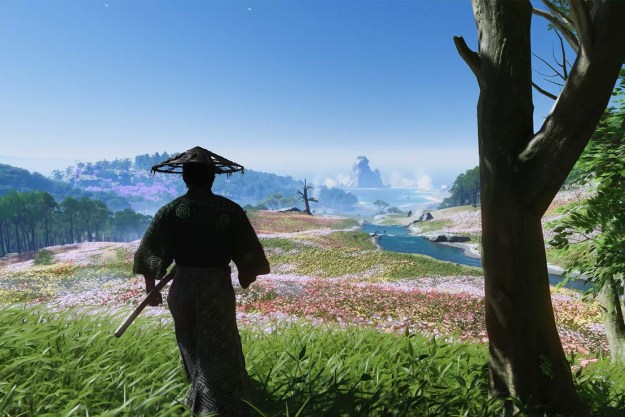
Just as with movies, TV shows and traditional games, a seamless and engaging soundtrack can go a long way to making you feel you’re there when blasting space aliens or exploring a VR landscape.
But of course, audio that’s all around you is different to the kind that comes pumping through speakers. To find out just how different, we reached out to the composer for PSVR exclusive Farpoint, Stephen Cox.
Digital Trends: What was your first experience with virtual reality?
Stephen Cox: I dabbled with the Oculus Rift when it came out, and played around with a few things that were in development at the time. I got to try the PlayStation VR headset while it was still in beta, during the Composers Kickoff. Sony took me into that room on a floor with top secret clearance and I got to try out the Aim prototype at the time. It didn’t look like it looks now, it looked like the gun from Farpoint, and I fell in love with it immediately.
How many of you worked on this project?
Danny McIntyre was my right hand man and co-writer, he and I did just about everything, but I also brought in David Kropf, who was our big percussion guy. He came in a few times with a kitchen sink – literally – of percussion instruments. We were like a band, a group of guys sitting around throwing ideas at the wall.
My other guys, were Stephen Wheeler and Michael Schiciano. We had them involved in field recording, so we could get even more crazy sounds that we couldn’t create in the studio. They created some awesome sample libraries that we ended up turning into instruments. They slammed dumpsters with their fists!
How do you go about building the soundtrack for a game like Farpoint?
We started with sound design first, where we’re designing tones and impacts – a unique sound palette that we can build on with traditional musical instruments. We rummaged through my garage and the local junkyard to find all sorts of metal and glasswork to bow or hit and with that we created a palette, or a toolbox, which we then brought into the game.
“We were all reinventing the wheel with VR sound.”
We mangled them a lot in computer software, but some of those sounds can be heard raw in the game itself, like an old trumpet my brother used to play in middle-school. It’s all beat up now, but we turned that into an otherwordly drone.
Everything was in the same key – B – a real pain in the neck for the cellists and violinists – but after we made that sound palette the notes really started to come together. From there it was a question of, ‘how deep do we go?’ but that was all dictated by the Sony project brief that we had.
Musically that made things a lot easier, as we had examples and an idea of the tone of the game. We wanted to create a sound that was original, that no one had ever heard before.
How did working on a virtual reality game change the way which you craft the soundtrack?
It was a process. We were all reinventing the wheel with VR sound. Does this wide thing work? Or is it better if we have instruments that are pin-point focused like a solo instrument that comes in? There were cases where both worked, but we had to try certain cues to find that out.
We dived into player driven cues more in the heavier action portion of the game. We used a ‘thermometer’ of intensity. There would be a base loop that’s around four minutes long, and then layers come in based on that thermometer. They all worked together, so could come in every two or four bars; it was really fun to figure out that musical puzzle. How do we write something where these stings and complimentary layers come in on top of the base loop?
We also had some stings which were location and player view based, where different parts of the cue would be triggered, and as long as the music is written in a way that it can come in every two bars and make musical sense with the base loop, then it works nicely.
Was it your choice to include a couple of karaoke tracks based on Del Amitri songs in Farpoint?
That was part of the script. That was written by Rob Yescombe, who put together a great script. We originally thought we’d have to write music to go along with the character singing those songs, but that wasn’t the case in the end. I don’t know if that was a copyright issue, but in the end we just had her singing.
You and your company, Unified Sounds, have done a lot of work with sports replays and stingers for some big sporting organizations. Are you excited about what you can bring to the table when it comes to VR sports viewing?
That’s something I’ve been doing personally for over a decade, and I think it’s really where I learned the ropes of developing sound for media. I’d love to see music like that incorporated into VR sports viewing, like adding virtual speakers to the stadium, so that you can have that music make sense in context.
“We wanted to create a sound that was original, that no one had ever heard before.”
That’s actually what I’m most excited about with VR, making the music, source music, where it makes sense in the world. Traditionally cinematic music has been an underscore, where the actors aren’t hearing the music, even though the audience is. That boundary is gone with VR, the audience and the participant can all hear it. I’m not sure what the template for how to do that is, but I think it’s very exciting.
Are you working on any other VR projects at this time?
I wasn’t able to talk about Farpoint for over a year, and that was really hard. If I was working on anything else right now, I wouldn’t be able to say, unfortunately. All I can say is that we have nothing official lined up at the moment.
Right now I’m just enjoying being on the ground floor of such an exciting new industry.
Farpoint is available to buy right now, alone and with its Aim Controller bundle. You can also pick up the official soundtrack from Stephen Cox and Unified Sounds on iTunes.




